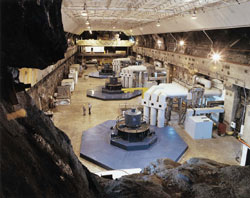I was thinking about what I might discuss when my eyes settled on this laminated card pinned to my bulletin board, my first official press pass:
 What a goober.
What a goober.
This was where my professional writing career began, fresh out of college at a small daily newspaper in central California. I got the job of part-time night-shift sports writer based on paltry clips of an opinion column I wrote for my college paper plus, I suspect, my ability to type fast--a skill not as common 20 years ago as it is today. I must have been the only applicant, because anyone else with respiration would've been better qualified. I nevertheless got a foot in the door and covered a season of high school basketball before a full-time (daytime!) position opened on the city beat and I was on my way.
One day the editor bellowed out into the newsroom: did anyone want to fly to Fresno for the weekend to cover the opening of a new power plant? Since no one else spoke up and I was trying to build a reputation as the go-to science guy, I took the assignment. It turned out to be a good story about a hydroelectric turbine complex dug deep inside a mountain between two lakes. The place looked like the cavern lair of a James Bond villain. I had fun, wrote the feature, and forgot about it.

Helms Pumped Storage Hydro Plant. I was there.
Twelve or thirteen years later, after a decade away from journalism, I applied for a position with a firm that wrote scientific, technical, and marketing material for people in the energy industry. I passed their writing test and showed up for the interview with one relevant clip: the power plant story. I got the job. And thanks to that job, just a couple of years later I was ready to break out on my own.
I derive three lessons from that story for the young'uns. First, take on tasks nobody else wants because someday, somehow, in a way you can't imagine, one of them will pay off. Second, one thing leads to another in unpredictable ways that only make sense in hindsight. A column in a college newspaper leads to part-time sports writing leads to full-time reporting leads to freelance magazine writing leads to something that begins to look like a career. Be ready for unexpected opportunities.
Third, if you want to be a writer, write. Anything. I learned the most about writing by covering a season of high school basketball. Two or three games are easy; by the tenth or twentieth you're working mightily to keep it interesting for both your readers and yourself. Because, let's face it, every high school ball game (or city council meeting or planning commission hearing) is pretty much like any other. I figured my job was to pay attention and figure out what made this game, meeting or hearing special, and then explain that. That made me a pro. (My personal definition of "professional" is "doing a good job even when you don't feel like it." Or, as Charles Schulz said, "writer's block is for amateurs.") I suspect that applies to art as well.
By the way, in my three years as a reporter and close to ten years as a freelance writer/journalist/editor, I've never once had to show a press pass to anyone. Too bad.

0 comments:
Post a Comment